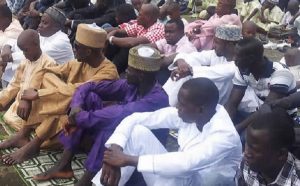Today is Eid el-Maulid. To mark the Islamic festival, the federal government has declared today, Tuesday, October 19, 2021, as a public holiday. Eid el-Maulid is observed annually to commemorate the birth of the Holy Prophet Muhammad – Peace be upon him (PBUH). He was born on the 12th day of Rabiul-Awwal in 570AD; described in Islamic history as the Year of the Elephant. Rabiul-Awwal is the third month in the Islamic lunar calendar.
In a statement to mark the ocassion, the Minister of Interior, Rauf Aregbesola, admonished all Nigerians to imbibe the spirit of love, patience and perseverance which he said “are the virtues of the Holy Prophet Muhammad (PBUH), adding that, “doing so will guarantee peace and security in the country.”
He further enjoined Nigerian Muslims to refrain from violence, lawlessness and other acts of criminality. The minister also urged all Nigerians, particularly youths, to embrace the virtues of hard work and peaceful disposition to fellow humans irrespective of faith, ideology, social class and ethnicity; and to cooperate with the President Muhammadu Buhari led-administration in its effort at building a progressive and enviable nation that all citizens would be proud of.
Maulid in Nigeria is traditionally celebrated by adherents of the Sufi order of Islam. The events usually organised to mark the occasion include public lectures, symposia, giving alms and inviting people to feasts. Preaching sessions are also organised to recite books of eulogy in honour of Prophet Muhammad (PBUH). During such sessions, scholars recite the popular poetry book, Qaidatul Burdah, authored by the famous 13th Century Sufi scholar, Imam Busiri. Similar poetry books that seek to extol the universal teachings of Prophet Muhammad (PBUH) are also read. Others engage in glorifying Allah’s most beautiful names (called Dhikr in Arabic).
Describing Prophet Muhammad (PBUH), Qur’an 33:21 states: “Ye have indeed in the Messenger of Allah a beautiful (pattern of conduct) for anyone whose hope is in Allah and the Final Day…” Indeed, he is an embodiment of all the virtues required by mankind to live a peaceful and prosperous life. Prophet Muhammad’s (PBUH) character perfectly epitomises honesty, contentment, modesty, kindness, compassion, humility, hospitality, tolerance, courtesy, good neighbourliness and altruism. His exceptional trustworthiness earned him the name “Al-Ameen” meaning “the trustworthy”. There is no better time to epitomise the teachings of Prophet Muhammad (PBUH) than now when corruption, injustice, deceit, greed, arrogance, wickedness, envy, malice, extremism, betrayal, religious intolerance, hate speech and bigotry have all strangely become typical of and dominant pattern of behaviour in the lives of some Nigerian Muslims.
Events in recent years show that neither do leaders in positions of authority see public office as a trust nor do those from among the followership hold pubic officers accountable. Many followers prefer that their leaders abandon the course of fairness in order to favour self-serving interests. The attitude on both sides of the divide is very unprophetic.
While the significance of Maulid lies in appreciating Prophet Muhammad’s (PBUH) virtues, the need to imbibe and strictly adhere to his virtuous traditions which serve as one of the two primary sources from where Islam derives its legislations cannot be more relevant and desirous than now. This should really take precedence over the congregational expression of love for his character during Maulid celebrations. It actually makes no meaning or sense to venerate Prophet Muhammad (PBUH) on the one hand and then contradict his orthodox traditions on the other. Allowing the teachings of Prophet Muhammad (PBUH) to permeate our lives is one functional way of bringing about a society founded on mutual trust, equity, love and justice.
This year’s Maulid celebration should be an occasion for Muslims to reassess their private and public lives with a view to preserving and upholding the path of righteousness, decency, fairness and sense of responsiility which the personality of Prophet Muhammad (PBUH) generally represents. We encourage Muslims to also use this occasion to pray for the unity, peace, stability and progress of Nigeria.


Leave a Reply